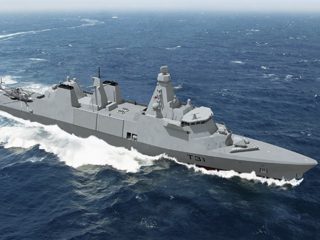
Industry News
KAEFER UK and Ireland, has announced that it has secured a long-term, £22m contract with Babcock, to provide technical surface protection to the Royal Navy’s newest frigate, the Type 31.
The shipbuilding programme which will continue until 2028, brings continuity of work for KAEFER’s existing industrial services workforce at Babcock’s Rosyth facilities, with new employment opportunities and prosperity for the local economy.
KAEFER will apply over 510,000m2of specialist paint coatings, providing skilled jobs for an additional 70 painters and support staff. With this work forming part of the build programme, KAEFER’s expertise, highest quality standards and long history of delivering ship support services safely, on time and on budget, is vital.
Sean Donaldson, Managing Director, Marine Engineering and Systems, Babcock International Group said: “The contract with KAEFER, to supply the Type 31 programme, builds upon years of collaboration between our organisations. New painting, protection and digitilisation technology will be deployed within a working arrangement, to deliver a successful project for our end customer, the UK Royal Navy.”
Image courtesy of Babcock International Group.

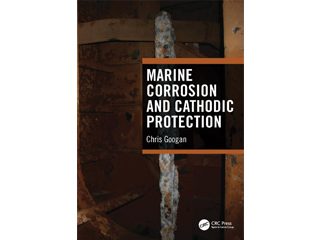
Industry News
Marine Corrosion and Cathodic
Protection, Ist Edition
By Dr Chris Coogan
Cathodic protection (CP) mitigates the high cost of steel and other alloys corroding in seawater and seabed sediments. Marine Corrosion and Cathodic Protection is a comprehensive guide to corrosion issues and presents methodologies to tackle common offshore code-based CP designs. Advanced theory is developed for non-routine CP applications, with and without subsea coating systems.
The interactions between CP and the fatigue and hydrogen embrittlement characteristics of alloys are explained. Sacrificial (or galvanic) anodes and impressed current systems are examined, followed by descriptions of successful and unsuccessful applications on petroleum installations, harbours, jetties, pipelines, windfarm foundations, ships, and floating production storage and offloading (FPSO) structures. Retrofit CP systems for the life extension of assets, together with methods for applying CP internally in both static and flowing systems are evaluated. A critical review of the role of physical and computational modelling in CP design and evaluation addresses the more geometrically complex applications. Techniques for, and limitation of, CP surveying, inspection and monitoring, are explained in the context of system management.
This book is ideal for engineers, designers, manufacturers, equipment suppliers and operators of offshore CP systems.
The author, Dr Chris Googan, is an AMPP International Accredited Corrosion Specialist. After graduating in chemistry, and spending several years in the steel and
copper industries, and in the protective coatings industry, he became a freelance corrosion engineering consultant. His experience of corrosion, materials, coatings and cathodic protection has been gained in over 40 countries.
Published by CRC Press, ISBN 9781032105819. Price £13

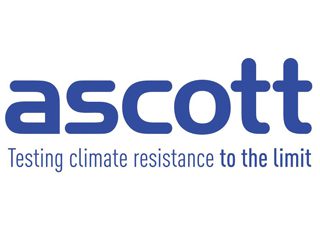
Institute News
Ascott Analytical Equipment
Ascott have been at the forefront of corrosion and salt spray test cabinets for over 30 years. Their business is totally focused on corrosion test equipment, and today they are one of the leading suppliers of salt spray cabinets and cyclic corrosion cabinets in the world, exporting to over 45 countries.
Everything produced is manufactured in their factory here in the Midlands, with local suppliers very much at the heart of the supply chain. Their latest range embodies customer led innovation, blending performance and technical excellence. The creation and control of corrosive climates has never been more demanding, and the development of new materials and surface coatings, plus increasing user expectations, has given rise to ever more rigorous testing. This is their forte.
Their expertise is the reassurance that a customer needs to ensure their testing is precise, compliant, and repeatable. Their equipment leads the world technically, but they also pride themselves on offering excellent value for money. Investment in an Ascott chamber offers the customer consistency, reliability, and, with their premium level of after sales support as standard, a high degree of confidence.
Many test standards can be complex and difficult to interpret, and the customers rely on their expertise, experience, and knowledge in this field to guide them to the exact product that will meet their needs. Every chamber is built to individual customer specification, even down to incorporating customer branding and corporate colours if required.
They also supply a comprehensive range of laboratory and field test equipment and consumables via an online shop, offering a convenient and trusted one stop solution for all your testing requirements.
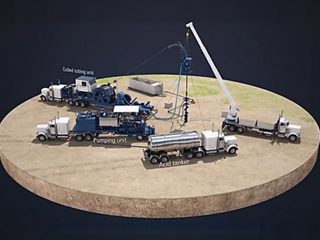
Institute News

The January technical meeting featured a presentation by Joshua Owen (pictured left), Research Fellow in the Institute of Functional Surfaces, School of Mechanical Engineering, University of Leeds, on “Advanced once-through flow cell methodology for validation of a new ‘staged’ inhibition approach for matrix acidising treatments” as part of a collaboration between Schlumberger and Leeds to evaluate staged inhibitor approaches prior to industrial application.
Schlumberger recently introduced and patented a new staged acid corrosion inhibitor (ACI) treatment concept for application in matrix acidising treatments. The staged treatment concept recognises that treatments which employ a fixed dosage of corrosion inhibitor may not be optimal in terms of their efficiency. The concept proposes staged pumping of a first fluid composition designed to establish a persistent inhibitor film (Stage 1) and a second fluid composition to maintain the film and its associated inhibited corrosion rate (Stage 2). The staged ACI concept has the potential to provide enhanced corrosion protection of wellbore casing and coiled tubing (CT) materials, whilst using the same total quantity of inhibitor compared to conventional treatments.

Typical Onshore Well Acidising Treatment.
Typically, the corrosion test methods used to evaluate this approach have involved preparing two equivalent pre-heated and conditioned glass reactors, one of which is used for the first film-forming stage and the other for the second film maintenance stage. This procedure is rather inconvenient and involves a short period of time (~1 min) during which the weight loss coupons or working electrode (a rotating cylinder electrode) are in contact with the atmosphere which could change the corrosion potential and could potentially have an influence on the inhibitor film formed during the first stage. Instead, a bespoke, electrochemical, milli-fluidic once-through flow cell was used for validation of the staged ACI concept by exposing a carbon steel coupon, mounted within the flow cell, to 4 M hydrochloric acid (HCl) flow at a temperature of 80 °C and a flow rate of 5 ml/min. A once-through flow cell enables testing in a continuously flowing environment whilst maintaining a fresh acid solution, a controllable supply of inhibitor, and eliminating any contact of the electrode with the atmosphere.
The system was used to quantify changes in corrosion behaviour during continuous flow and during transitions from the first to second stage inhibitor dosages, to find optimal inhibitor concentration for film-forming and film maintenance stages, and to investigate the effect of metal pre-corrosion on inhibitor performance for carbon steel used as wellbore casing and CT materials. In situ linear polarisation resistance measurements confirmed that an acetylenic alcohol-based polymerisable inhibitor, used at a concentration of 0.01 wt.% in Stage 2 after a 0.2 wt.% concentration film forming stage (Stage 1), maintained excellent corrosion protection of N80 (wellbore casing) and HS80 (CT) carbon steel, with corrosion rates of < 5 mm/year measured.
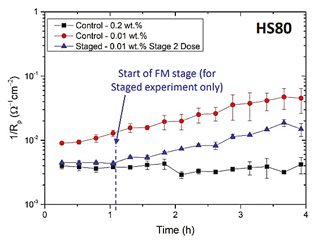
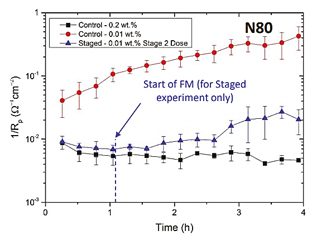
Significant corrosion rate reductions achieved with staged inhibition versus applied controls.
Advantages of the flow cell for application in ACI studies are:
1. Well-defined hydrodynamics: Consistent and predictable flow across metal surface once-through nature:
2. Fresh HCl and ACI are continuously replenished and flow into waste, maintaining consistency in experimental conditions throughout In situ electrochemical measurements:
3. Measurements of corrosion rate in real time seamless condition changes:
4. Composition of fluid can be easily changed prior to inflow during an experiment (no exposure of coupon to air)
For the February presentation, Leo Richards, Principal Engineer and Andrew Duncan, Lead Consultant, both with Intertek Production and Integrity Assurance Group, described the “Implementation of Plan-Do-Check-Act review.

Leo Richards (left) Intertek Principal Engineer Production Chemistry and Andrew Duncan (right) Intertek Lead Consultant, Production and Integrity Assurance.
Corrosion management guidelines were used as the basis for an audit study of a large onshore oil field, the purpose of which was to perform a detailed review of the corrosion monitoring and mitigation systems, and to advise on any required upgrades to ensure world class/excellent asset integrity performance.
The approach taken for the study was to follow the UK Health and Safety Executive’s guidance for ‘Managing Health and Safety’, HSG65 (2013), of PLAN-DO-CHECK-ACT, which considers both Technical and Systems approaches associated with managing assets safely. This is a closed loop planetary model commencing with a high-level corporate policy for health and safety, under which there is a policy and plan for managing corrosion and integrity. The model ends with lessons learned which feed back into the corrosion and integrity policy and plan to ensure risks are managed to ‘As Low as Reasonably Practicable’.
The model ends with lessons learned which feed back into the corrosion and integrity policy and plan to ensure risks are managed to ‘As Low as Reasonably Practicable’.
First, a detailed study was carried out to assess and identify the current corrosion management techniques being used and their effectiveness in the operator’s fields and process plants. The ‘gaps’ were identified within the assets, and corrosion management proposals and solutions were then provided to ensure world class asset integrity performance.
A desktop-based document review was conducted in the UK and also at the client’s offices. This was followed up by site surveys, which included visits to at least one plant of each of these facility types: gas station, degassing station, gas recycle plant, PWI stations, gas distribution stations and stripping plants.
In order to help delegate and spread some of the responsibilities for the study areas within the operator’s corrosion team, Intertek deployed RACI Charts: Responsible – Accountable – Consulted – Informed, which serves to provide structure to the corrosion team as a whole, defining who does which task and allowing the right people to do the right job and move on with it.
The study highlighted a distinct pattern in the working practices of the operator with virtually all sections of the corrosion management system being shown to have some form of PLAN and DO. However, the implementation of the CHECK and ACT stage was missing from almost all aspects.
Some Key Findings
1. Automation and use of a suitable database/Corrosion Management System makes the DO stage easier and quicker.
2. For CHECK and ACT – an automated system requires Specialist assessment, rather than total reliance on the CMS output. Automation may also result in complacency.
3. For CP monitoring, sensors need to be regularly calibrated, and the system checked to ensure full protection.
4. Data requires to be both CHECKED and reviewed.
5. ACT will have double impact – ACT on what the data has shown and ACT on how the data was gathered.
Future Application of P-D-C-A and Corrosion
Monitoring
The working world has changed dramatically over the last two years due to Covid and there has been a significant change in Engineers’ working patterns and methods of project study and delivery. This has also combined with a move towards remote and automated inspection and monitoring, however, the speakers were keen to stress that if the PLANNING Stage is not implemented correctly, then wholesale automation of integrity systems is not always helpful, as automated systems will follow ‘Garbage In Garbage Out’ scenarios, Specialist input is always required. (Editor: Readers should note that a longer technical article on this topic appears later in this issue of the magazine).
Both these very engaging presentations generated many questions from the audience that were expertly responded to by the speakers, and all Q&A write-ups may be found on the branch webpage.
Slides of technical papers for branch events, along with their respective Q&A’s can be found at, ICorr Aberdeen Branch (google.com) under Local Technical Programme, Aberdeen Branch – Institute of Corrosion (icorr.org). A library of event recordings may also be found at: ICorr Aberdeen – YouTube.
It is also with our great pleasure to announce that Rysco International Inc. based in Alberta, Canada, has become the latest new sponsor of the branch, as well as becoming a GOLD sustaining member of ICorr. The branch is very grateful to all its sponsors for their continued support.
Finally, the branch is very sad to report the recent passing of Carol Anne Powell BSc., FIMMM, a long-term consultant to both the Nickel Development Institute and the Copper Development Association.
She had written over 40 papers and publications and been a member of our Partner Organisation the Marine Corrosion Forum (MCF), since its inception. During the recent COVID-19 epidemic as we were moving increasingly towards Webinar formats in April 2020, Carol greatly assisted us with an excellent presentation to our ICorr/MCF membership entitled ‘An Overview of the Corrosion of Metals in Seawater. In her memory, we would respectfully direct you to: https://marinecorrosionforum.co.uk/free-webinar-30%2F04%2F2020
Aberdeen Branch call for papers – Technical Session 2022 – 2023
The Aberdeen branch would like to invite you (or a colleague) to give a presentation during their 2022/2023 session. The events normally are held at 6 pm on the last Tuesday of the month from September till May 2023, excluding December 2022.
Topics on pressure systems, pipelines, renewables and structural integrity management with regards to the material selection, production chemistry, welding, corrosion/microbiological control and monitoring, inspection techniques and data analytics, are acceptable. Past case studies, project experiences, and emerging technologies have proved popular and interesting to members, and are particularly welcome.
The attendees (members and non-members) include students, technicians, technologists, engineers, scientists, researchers, managers, company directors and other professionals from the oil and gas, power generation, manufacturing and renewables sectors. Subsequently we would publish a report of the presentation in Corrosion Management magazine, and also on the ICorr, and Aberdeen website pages, including the presentation slides and Q&A session write-up. A recording of the event (if conducted online) will be uploaded to our YouTube channel later.
If interested, please supply the following including, speaker’s name, role and company, short biography of the speaker(s) (~ 150 words) and the proposed presentation title and an abstract (400 words), to the ICorr Aberdeen Branch Chair, Hooman Takhtechian, via htakhtechian@oceaneering.com and please also copy in icorrabz@gmail.com in your submission.
All the submitted presentations will be subject to a branch committee review and those successful will be scheduled into the 2022/2023 events programme. Please note that the deadline of the submission is
30th April, and the branch will confirm the successful presenters in May, and announce them in June.
London Branch, Uncategorized
The branch’s February technical meeting was held online, to a large audience including many international attendees, and Mr. Phil Low, presented on “Diversified Approach to Vapor Corrosion Inhibitors (VCIs).”
Philip Low is European/Middle East/GCC Business Development Manager Zerust Oil & Gas. He has 25+ years’ experience in the Global Oil
and Gas industry.

Phil (pictured above) started his presentation by explaining that VCIs are a variety of chemical formulations which prevent corrosion of metals. First patented in 1948 by Shell, VCI’s have evolved into many applications, from powder and liquid forms, to being infused in plastic, oils and greases, and many other delivery methods. He showed a brief animation illustrating how VCIs work and then described the standards and regulations for VCI Use, including:
• NACE TG543: Standard for External Corrosion Control of On Grade Carbon Steel Storage Tank Bottoms
• API 2610 Design, Construction, Operation, Maintenance, and Inspection of Terminal and Tank Facilities, section 12.5 Volatile Corrosion Inhibitors (VCI)
• API 651 Cathodic Protection of Aboveground Petroleum Storage Tanks
• API TR655 Vapor Corrosion Inhibitors for Storage Tanks
Phil then reviewed the many storage tank foundation designs compatible with the use of VCIs for corrosion protection of the tank bottoms, and went into the details of the various methods for validating the effectiveness of VCIs in the field, such as:
• Coupons
• Electrical Resistance Probes
• Ultrasonic Thickness Probes
• Inhibitor Delivery
• Gas Detection
The many VCI application uses in the Oil & Gas industry, were described, including corrosion protection of metals in static, enclosed environments such as:
• Beneath Tank Floors
• ZIF Tape (Impregnated with VCIs) for corrosion under insulation (CUI), scab repairs, and flange protection
• Preservation/Warehousing/Mothballing
• Pipeline Protection and Preservation
• Pipe Casings
• Rust removal/waxes/greases/RP’
Phil concluded that:
• Design and materials help mitigate corrosion
• Cathodic Protection is effective in mitigating corrosion
• Standards and Regulations are looking at new tools to combat corrosion
• Vapor Corrosion Inhibitors are one of those tools
• Field experience indicates that VCIs are effective
There was an extensive question and answer session, and Phil was thanked for his presentation.
The branch AGM was held on 10th March, and the chair, Ben Moorhouse described that the last year had been difficult for everyone, and that the technical presentations had been held virtually, however as the country was getting back to a more normal state, in-person meetings were now being held, of which this will the first. As the virtual meetings had been appreciated by many who could not get to London easily, or were based abroad, technical presentations going forward would be hybrid, in person/virtual events. The branch treasurer, Jim Glynn, then presented the accounts, which highlight that approx £6,500 of our allocation had been returned to head office, as there had been few physical meetings. These were accepted by the floor. The branch committee was then elected with no objection, and Ben then welcomed the new members, Polina Zabelina (who will take over the role of chair), Adam Cliff, Xinming Hu, and Anthony Setiade, and thanked the retiring members, Trevor Osborne and Peter Sinclair, for their contributions to the working of the branch. He also explained he was leaving due to a new work posting.
After the AGM, Ben then gave the usual chair’s presentation, which was on the “Flint Water Crisis – Corrosion, Management and Politics”. The town of Flint in Michigan, suffered one of the worst water crisis in the United States of America in 2014, when the tap water supply began to be poisoned with corrosion products and other toxins. Hundreds of thousands of Flint residents were exposed to dangerous levels of lead and outbreaks of Legionnaires disease that caused deaths and many long-term health problems. This talk focused on the decisions that led to this outcome, the corrosion engineering around ensuring safe water sources, and the importance of ensuring a greater understanding of corrosion issues in relation to environmental issues. Approx. 30 people attended this very interesting talk, including members from S. Africa, Canada, and the Middle East online.
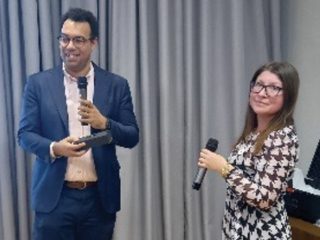
Ben was then presented with a branch pen in thanks for his presentation by the incoming chair, Polina.
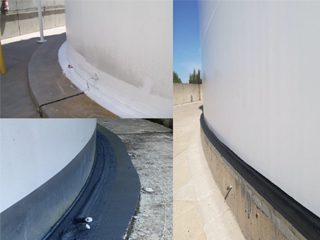
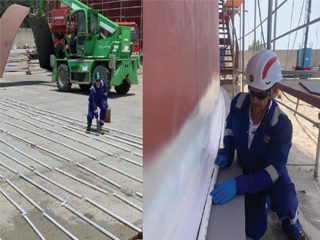
Protection of tank bottoms using Vapor Corrosion Inhibitors (VCIs).
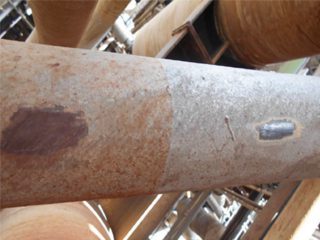
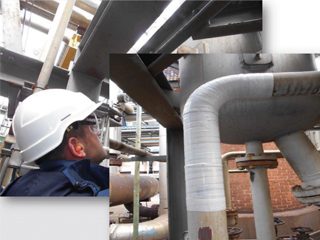
Corrosion Under Insulation (CUI) / scab repair using ZIF tape.

Ben Moorhouse.

